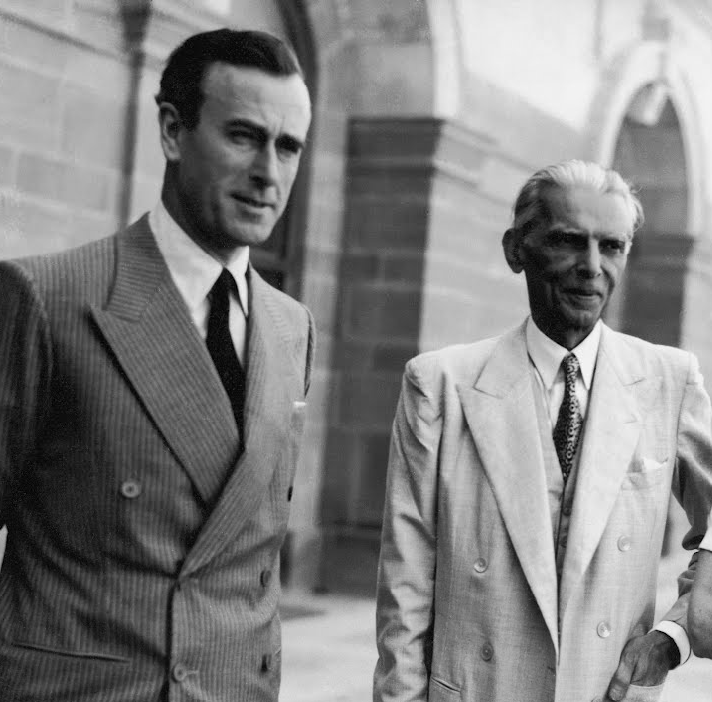The Secret Of The Millennium
August 47
The Secret Of The Millennium
"If I had only known all this at the time, the course of history would have been different. I would have delayed the granting of independence for several months. There would have been no Pakistan."
Lord Louis Francis Albert Victor Nicholas Mountbatten
Above is the instant reaction, waving the medical report several times in the air, by none other than Lord Louis Francis Albert Victor Nicholas Mountbatten, 1st Earl Mountbatten of Burma and the last Viceroy of India, who oversaw the partition of August 1947. Lapierre recalls that 'when we showed the report of their meeting with the Indian doctor, it made him (Mountbatten) blanch suddenly. 'I can't believe it!' 'Good God', he gasped, with his usually so calm, blue eyes shrinking with intense emotion'.

It is early 1970s. Larry Collins and Dominiq erre are researching for their book Freedom at Midnight when an old friend of Quaid-e-Azam Muhammad Ali Jinnah shares a confidential file with them, titled "M A Jinnah". There is an X-ray film, sealed in an unmarked envelope. This old friend of Quaid is Dr Jal Rattanji Patel, a renowned and highly learned Zoroastrian doctor, a former dean of Grant Medical College Bombay, who also happened to be personal physician of the Quaid. What he reveals to them turns out to be the most guarded secret of the 20th Century.
Going back a quarter of a century in time:
It is early 1947 now. The debate between the Muslim League and the Congress is at its peak as to whether the India should remain united or Muslims get Pakistan as a separate homeland, once Britain decides to leave India. Quaid-e-Azam is sitting in the office of Dr Patel. 'You're reaching the end of your physical resources, you need to ease the pressure on your system. Unless you reduce this workload... and decide to go on, I am afraid you do not have more than one or two years to live'; utters Dr Patel. 'Let it be between the two of us, I cannot give up now on the commitment that I've given to my people, for the sake of my own health', replies the most determined and resilient man that the Sub-Continent of India has seen in centuries.
Mountbatten's reaction was obvious. He knew that barring Jinnah, there was no other leader in Muslim League who could match the Quaid's stature, to measure up to Jawaharlal Nehru and Sardar Vallabhbhai Patel. Except him, no other had the potential to justify a separate homeland on the basis of two-nation theory, or had the tenacity to face the Hindu-British intrigues as well as infighting among the Muslims.
Mr Kamleshwar in his Hindi novel Kitne Pakistan (translated in English by Ameena Kazi Ansari as Partitions), argues that the British secret service and allied agencies which had so successfully ferreted out the innermost secrets of invincible dictators like Hitler and Mussolini, had no inkling at all of the Quaid's disease.
Larry and Lapierre, in Freedom at Midnight, argue that Partition could have been bypassed if "the most closely guarded secret in India" had become known, that is, Jinnah was suffering from tuberculosis which was slowly but surely killing him, and that he had not much time to live. Here is an excerpt from the book:
"The knowledge of one's own slow demise would have broken the will of most people, but Jinnah remained a man unmoved... Nothing except the grave was going to turn him from the task... of leading India's Muslims at this critical juncture in their history."
Dr Ghulam Nabi Kazi in his article Mr Jinnah and his secret battle against tuberculosis, published in Daily Nation, claims that Dr Patel's fellow Zoroastrian radiologist, Dr Jal Daeboo also knew about it. Both kept the medical files and X-ray films so confidential that neither the intelligence agencies, nor the political parties had any knowledge of the illness. Pakistan perhaps owes its existence to the professional ethics of these two gentlemen. According to him, Dr Daeboo's daughter, Homi, made a mention that Jinnah was virtually under a death sentence while he went about bravely arguing his case for Pakistan at all forums, with dignity and honour.
It is the start of August in 1947. Alone as ever and immaculately dressed while journalists are looking for him all over Bombay, he remains seated, upright on a wooden bench for three-four hours, gazing silently, at the tomb-stone of his departed wife until it starts getting dark. 'I've fulfilled my promise of a separate homeland', Muhammad Ali Jinnah whispers to Ruttie Jinnah, about the dream that he had often discussed with her during her lifetime.
Pakistan was the first ever state that came into existence based on an ideology. It was an unparalleled event of creation of an independent state. The country appears on the global map on 14th August 1947 with Quaid as her first Governor-General. His health starts deteriorating by the end of April 1948, his confidante Miss Fatima Jinnah also learns about it for the first time, and he leaves for eternity on 11th September, a year and a half after learning of his terminal disease for the first time. One of the most significant men in the history of mankind, single-handedly provided an independent country, and the guidance to run it. This well- kept secret of the Quaid-i-Azam's battle against tuberculosis (TB), resulted in the creation of ideological state of the Islamic Republic of Pakistan, and turned out to be the secret of the millennium.
Request a Visit
The Army Institute of Military History
Preserve and promote the military history of Pakistan and the history of the Pakistan Army, while acting as the center of excellence for studying military history, and providing a forum for open-source intellectual input to the Pakistan Army, through two-way interaction with academia and civil society.
Contact Information
- 252 Aziz Bhatti Road
Rawalpindi, 46000
Pakistan - admin@aimh.gov.pk
- (92) 51 - 520 2244 (ext142)

